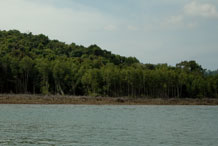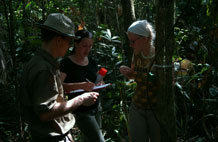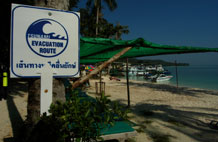FORRSA
Forest restoration and rehabilitation in Southeast Asia

Period
1 December 2005 - 30 November 2008
Partners in Europe
- Finland , University of Helsinki (UH) / Viikki Tropical Resources Institute (VITRI), Helsinki
- Germany , Ludwigs-Maximilians-Universität (LMU) / GeoBio-Center, Biology Department II, Munich
- Denmark , University of Copenhagen (UC) / Danish Centre for Forest, Landscape and Planning, Copenhagen
Partners in Asia:
- Indonesia , Java, Bogor Agricultural University (IPB) / Faculty of Forestry, Bogor
- Thailand , Kasetsart University (KU) / Faculty of Forestry, Bangkok
Financing
From EU Asia-Link programme
Project coordinator institution
University of Helsinki / Viikki Tropical Resources Institute (VITRI)
Project leader
Prof. Olavi Luukkanen
Project coordinator
Dr Eshetu Yirdaw
Project Summary
The project aims at the human capacity enhancement of Asian and European young academics and postgraduate students for teaching and research on restoration and rehabilitation of degraded forests and wetlands in Southeast Asia, specifically Indonesia and Thailand. The special emphasis is on the use of multi-criteria analysis/decision making by integrating GIS methods and tools with ecological and social knowledge. The project provides a foundation for fostering new institutional partnerships and reinforcing existing research/training cooperation. Proposed activities include intensive courses (training for trainers), field studies and teacher and student exchange for young academics and postgraduate students. These activities will be supported by joint workshops for curriculum development and for sharing the best practices in education and research among the partner institutions and other selected organisations. The duration of project is 36 months.
EU Asia-Link FORRSA project activities
1. Training of trainers
Preparation and consolidation of teaching tools, methods and material
Objectives
- Prepare and consolidate locally appropriate training methods, tools and materials on the restoration and rehabilitation of degraded forests and wetlands which are to be used and tested in training of trainers;
- Evaluate and further develop the tested teaching methods, tools and materials according to the experiences and results obtained in training of trainers;
- Translate the developed teaching materials to local languages; and
- Establish e-learning tools and materials for organising of a distant learning programme
Training of trainers teaching modules
Objectives
- Implement a series of short intensive courses in the form of two teaching modules for young academic staff members and postgraduate (MSc and PhD) students of Asian and European partner institutions aiming at enhancing the capacity for teaching and research on the restoration and rehabilitation of degraded forest and wetland areas;
- Promote practical problem solving skills and multi-criteria decision making in the Southeast Asian institutions; and
- Develop and utilise e-learning tools such as WebCT and BSCW adapted to the needs of Asian partner institutions.
Courses offered by the project to staff and postgraduate students of partner institutions
| Course name | Location, time | Participants | Organisers |
| Restoration ecology RE_1 | Thailand , 3 weeks, 2006 | Academic staff, postgraduate students from Europe and Asia | UH, KLV, KU |
| Restoration ecology, RE_2 | Thailand , 3 weeks, 2008 | Academic staff, postgraduate students from Europe and Asia | UH, KLV, KU |
| GIS_AL1 | Indonesia , 2 weeks, 2006 | Academic staff, postgraduate students from Asia | UH, LMU, IPB |
| GIS_AL2 Indonesia | 2 weeks, 2007 | Academic staff, postgraduate students from Asia | UH, LMU, IPB |
| GIS_AL3 Finland | 1 week, 2007 | Academic staff from Asia | UH, LMU |
2. Field studies in Indonesia and Thailand
Objectives
- Enhance the capability of young Asian and European scientists and postgraduate students to apply the GIS/RS as well as ecological and social methods and tools in the field studies related to the restoration and rehabilitation of degraded forests and wetlands (including tsunami affected areas); and
- Facilitate the field work of postgraduate students preparing master or doctoral theses.
3. Mobility of Asian young scientists and postgraduate students to Europe
Objectives
- Promote the mobility of young Asian scientists/teachers and postgraduates (MSc and PhD) students to Europe; and
- Enhance the possibilities of Asian partners to update their teaching material and pedagogical methods, bibliographical references and the courses they offer at their home institutions.
4. Project workshops
There will be three workshops – one in Thailand, Finland and Indonesia.
Objectives
- Promote the mobility of young Asian scientists/teachers and postgraduates (MSc and PhD) students to Europe; and
- Enhance the possibilities of Asian partners to update their teaching material and pedagogical methods, bibliographical references and the courses they offer at their home institutions.
5. Publication and dissemination of information on the project
Objectives
Ensure a wider dissemination of information and knowledge generated by the project.




